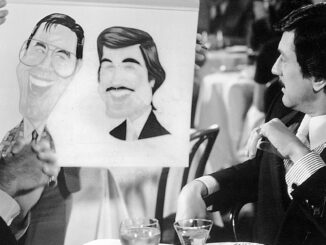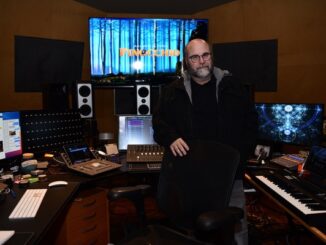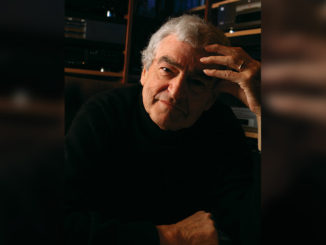
by Louis Bertini, MPSE

When Tony Soprano awoke in the hospital from a coma, after being shot by his Uncle Junior, his wife Carmella, sitting by his side, said to him, “Tony you’re not dead…you’re in Newark.”
New Jersey––the western portion of the Guild’s eastern region––has always lived in the shadow of New York, and has been the butt of countless jokes at its expense. (Why is it called “The Garden State?” Because “The Petro-Chemical Processing State” is too big to fit on the license plate.) But if you think that last season’s final episode of The Sopranos also means the end of production work in New Jersey, then the joke is on you.
Four years ago, when work in the state was slow, the New Jersey Film and Television Commission was on the verge of being disbanded. Editors Guild Assistant Executive Director Paul Moore and other IATSE Locals began a letter-writing campaign to then-Governor McGreevey, and the state legislature. They urged that the program not be shut down. They reminded officials that New Jersey played a large role in the birth of the movie business.
In 1893, Thomas Edison opened “The Black Maria Studio” (pronounced Mariah) in West Orange. It was given this name because the building resembled the shape of a police paddy wagon. Widely considered to be the first movie studio in the United States, it was there that Edwin S. Porter made The Life of an American Fireman (1903) and The Great Train Robbery (1903), considered to be the first movies that used picture editing to drive the narrative. From 1908 to 1910, D.W. Griffith shot hundreds of silent short films all over New Jersey and New York before moving west to Hollywood.
In the early 1900s, Fort Lee, New Jersey was home to 14 different movie studios. Such future Hollywood moguls as William Fox, Jesse Lasky, Marcus Loew, Lewis Selznick, Joseph Schenk and Adolph Zukor all opened their first studios there. Over the course of their history, they produced thousands of silent films.
But the year 1918 brought a brutal winter. The cold weather was so great that it halted operations at the region’s coal mines. The studios found themselves without heat, and were forced to curtail operations. That was also the year of the great influenza pandemic. The movie business in New Jersey and New York shut down and shifted almost completely to Southern California.
In 2003, the Eastern Region unions held a rally at the site of Edison’s original studio to fight for the New Jersey Film and Television Commission, as well as tax credits to help stimulate production. The Legislature ultimately created a feature and television tax credit program, similar to the one in New York. But while New York offers a 15 percent tax credit to qualifying productions, New Jersey tops it by offering a 20 percent tax credit. And just like in New York, the tax credit has paid for itself many times over from the increase in business.
There are many video, computer graphics, and audio services in the state, but these generally serve local broadcasters and advertising companies. Nevertheless, increased production in New Jersey feeds into the post-production system overall, and keeps more of our members employed.
I spoke recently with Steven Gorelick, the associate director of the New Jersey Film and Television Commission, who told me that the tax credit has greatly increased production, and that the commission is busier than ever before. There are currently 16 features shooting or in pre-production in the state. Some are large-budget West Coast features, using New Jersey as a location. Some are New York-based features, But a surprising number of them are independent projects, put together by local producers.
A good example of this is the feature film Choke, which has recently wrapped shooting in Essex County. Executive producer Mike Ryan told me that this type of project, which could be described as an “art” film, is difficult to finance. He found his most desirable location in New Jersey. Without the money he saved from the tax credit, he would have been forced to move the shoot to Tennessee or North Carolina.
This savings also allowed him to sign a contract for the production with the IA and the Editors Guild, and pay the benefits for all of his employees. He said that the help he received from the Guild was invaluable in working out the details of the contract––and in hiring the best crew for the job.
The post-production industry in New Jersey, however, is not very big. If a show is finished locally, the work is done in Manhattan. If not, it is sent back to Los Angeles. There are many video, computer graphics, and audio services in the state, but these generally serve local broadcasters and advertising companies. Nevertheless, increased production in New Jersey feeds into the post-production system overall, and keeps more of our members employed.
New Jersey also has lower housing costs than New York. Three-bedroom houses and condominiums can be bought in Jersey City or Newark for half the cost of similar units in Brooklyn or Queens. Many of our members who have been die-hard New Yorkers their whole lives cannot resist the temptation to save some money and are now moving to the west side of the Hudson in search of more affordable homes.
The tax credit has greatly increased production, and that the commission is busier than ever before.
Newark is the largest city in the state. It currently has a population of over 280,000 residents, but is considered to be under-populated. The social unrest of the 1960s caused many of its residents to abandon the city, and move to the suburbs. For too long afterwards, Newark was synonymous with urban blight. But since that time, the city has slowly been struggling to rebuild itself.
The wave of prosperity that hit New York City in the 1990s brought economic benefits to all of the tri-state area. The blighted areas of Newark are slowly being torn down and replaced with new homes and condominiums. The city has several Art Deco-era skyscrapers, built by the same architects who put up the famous buildings of Manhattan. Also, a new performing arts center and sports arena for the New Jersey Devils hockey team represent the linchpin for what is hoped to be a rebirth of the downtown area.
So the next time you get ready to tell a New Jersey joke, you might want to think twice about it and pick on someplace else (Pennsylvania, for instance). The Sopranos might be gone, but New Jersey is still open for business.
Louis Bertini, MPSE, is a Sound Editor who represents the Eastern Region on the Guild’s Board of Directors.





